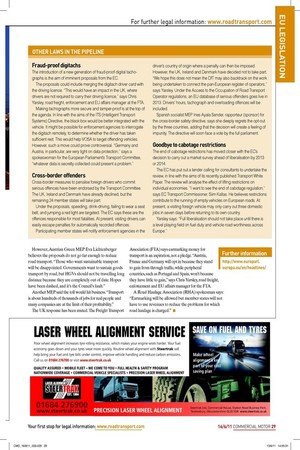OTHER LAWS IN THE PIPELINE Fraud-proof digitachs
Page 25

If you've noticed an error in this article please click here to report it so we can fix it.
The introduction of a new generation of fraud-proof digital tachographs is the aim of imminent proposals from the EC.
The proposals could include merging the digitach driver card with the driving licence. “This would have an impact in the UK, where drivers are not required to carry their driving licence,” says Chris Yarsley, road freight, enforcement and EU affairs manager at the FTA.
Making tachographs more secure and tamper-proof is at the top of the agenda. In line with the aims of the ITS (Intelligent Transport Systems) Directive, the black box would be better integrated with the vehicle. It might be possible for enforcement agencies to interrogate the digitach remotely, to determine whether the driver has taken sufficient rest. This would help VOSA to target offending vehicles. However, such a move could prove controversial. “Germany and Austria, in particular, are very tight on data protection,” says a spokeswoman for the European Parliament’s Transport Committee, “whatever data is secretly collected could present a problem.”
Cross-border offenders
Cross-border measures to penalise foreign drivers who commit serious offences have been endorsed by the Transport Committee. The UK, Ireland and Denmark have already declined, but the remaining 24 member states will take part.
Under the proposals, speeding, drink-driving, failing to wear a seat belt, and jumping a red light are targeted. The EC says these are the offences responsible for most fatalities. At present, visiting drivers can easily escape penalties for automatically recorded offences.
Participating member states will notify enforcement agencies in the driver’s country of origin where a penalty can then be imposed. However, the UK, Ireland and Denmark have decided not to take part. “We hope this does not mean the DfT may also backtrack on the work being undertaken to connect the pan-European register of operators,” says Yarsley. Under the Access to the Occupation of Road Transport Operator regulations, an EU database of serious offenders goes live in 2013. Drivers’ hours, tachograph and overloading offences will be included.
Spanish socialist MEP Ines Ayala Sender, rapporteur (sponsor) for the cross-border safety directive, says she deeply regrets the opt-out by the three countries, adding that the decision will create a feeling of impunity. The directive will soon face a vote by the full parliament.
Goodbye to cabotage restrictions
The end of cabotage restrictions has moved closer with the EC’s decision to carry out a market survey ahead of liberalisation by 2013 or 2014.
The EC has put out a tender calling for consultants to undertake the review, in line with the aims of its recently published Transport White Paper. The review will analyse the effect of lifting restrictions on individual economies. “I want to see the end of cabotage regulation,” says EC Transport Commissioner, Siim Kallas. He believes restrictions contribute to the running of empty vehicles on European roads. At present, a visiting foreign vehicle may only carry out three domestic jobs in seven days before returning to its own country.
Yarsley says: “Full liberalisation should not take place until there is a level playing field on fuel duty and vehicle road worthiness across Europe.”














































